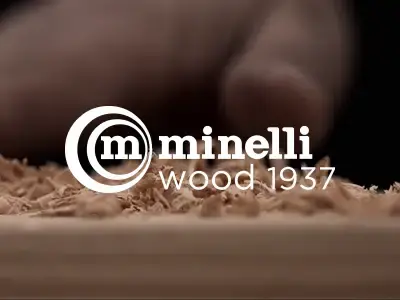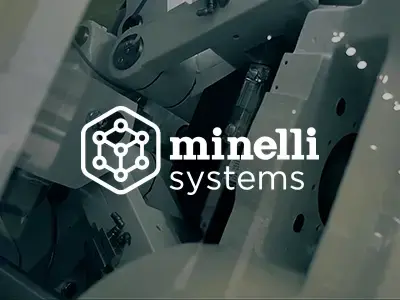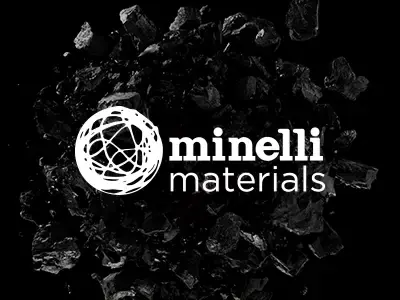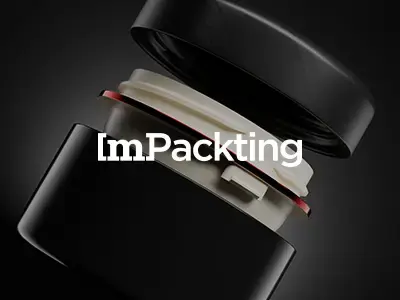 As consumers become increasingly eco-conscious, the demand for sustainable products has expanded into every corner of the home, including the kitchen. Kitchenware, specifically knife handles and other everyday items, is seeing a revolution in design, moving away from traditional materials towards more sustainable, eco-friendly alternatives. Today, manufacturers are not only focusing on aesthetics but also prioritizing functionality, environmental impact, and ergonomics in their designs.
As consumers become increasingly eco-conscious, the demand for sustainable products has expanded into every corner of the home, including the kitchen. Kitchenware, specifically knife handles and other everyday items, is seeing a revolution in design, moving away from traditional materials towards more sustainable, eco-friendly alternatives. Today, manufacturers are not only focusing on aesthetics but also prioritizing functionality, environmental impact, and ergonomics in their designs.
This article explores some of the innovative approaches driving the transformation of kitchenware and knife handles.
The rise of eco-friendly materials for knife handles
One of the most significant trends in kitchenware design is the shift towards eco-friendly materials. This change is driven by both consumer demand and manufacturers’ commitment to reducing environmental footprints.
Some of the most innovative materials include:
- Upcycled Wood: rather than simply recycling old materials, upcycling transforms discarded wood into high-quality, durable kitchenware with enhanced value. This approach often involves taking wood from old furniture, construction materials, or other sources that would otherwise go to waste, and turning it into beautifully crafted knife handles and cutting board designs.
- Cork: another material growing in popularity is cork, harvested from the bark of cork oak trees. Known for its buoyancy, elasticity, and fire resistance, cork is an eco-friendly option for knife handles. It’s lightweight, comfortable to grip, and provides excellent moisture resistance, making it a perfect addition to eco-conscious kitchen designs. Plus, harvesting cork doesn’t harm the tree, and it regenerates naturally, further enhancing its sustainability credentials.
- Bio-based plastics: as an eco-friendly alternative to traditional plastics, bio-based plastics are made from renewable resources such as cornstarch, sugarcane, or potato starch. These materials are biodegradable and help reduce the pollution associated with conventional plastics. However, while bio-based plastics offer durability and moisture resistance, they may not provide the same tactile experience or emotional connection that natural wood does. Knife handles made from wood offer a warmer feel in the hand, which many users prefer.
- Bamboo: bamboo has also become a popular material for kitchenware due to its fast growth and versatility. However, despite its reputation as an eco-friendly option, bamboo is not always as sustainable as it appears. The environmental impact of bamboo depends on factors such as how it is harvested, processed, and transported. Industrial farming practices, heavy chemical treatments, and long shipping distances can offset some of bamboo's ecological benefits. We wrote an article about this specific topic; you can read it here.
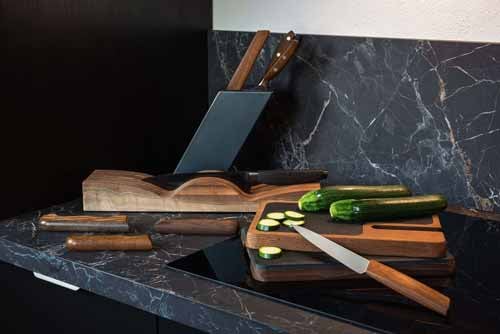
Ergonomic designs that prioritize comfort and sustainability
Eco-friendliness doesn’t have to come at the expense of comfort or performance. In fact, many innovative designs in knife handles and kitchenware are as focused on ergonomic benefits as they are on sustainability.
- Textured handles for better grip: sustainable materials like wood and cork often come with natural textures that provide better grip, enhancing safety during use. Knife handles, for instance, are now designed with subtle grooves or patterns that reduce slippage and improve control, even when the user’s hands are wet. These designs add functionality while maintaining an aesthetically pleasing, eco-conscious appearance.
- Lightweight designs for ease of use: wood, cork, and bio-based plastics are all lightweight materials that reduce the strain on the user’s hands during prolonged use. This is particularly important for home cooks and professional chefs who spend significant amounts of time in the kitchen. The move towards lighter, more comfortable designs enhances user experience while still promoting the use of sustainable materials.
- Natural ergonomics with curved handles: some manufacturers are focusing on designing knife handles with natural curves that follow the shape of the hand. This reduces the effort needed to cut, chop, and slice, making kitchen tasks easier and more comfortable. By combining ergonomic design with eco-friendly materials like cork or upcycled wood, these knife handles provide both sustainability and usability.
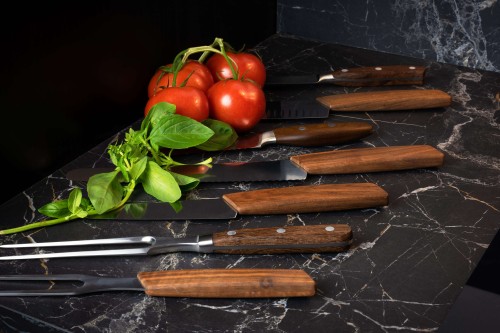
Enhancing aesthetic appeal with sustainable designs
Sustainability and style are no longer mutually exclusive. Kitchenware designers are integrating eco-friendly materials in ways that enhance, rather than detract from, the aesthetic appeal of their products.
Here are a few ways they are doing this:
- Unique wood grains and finishes: wood brings natural, unique patterns to knife handles and cutting boards, creating one-of-a-kind kitchen items. This material is often treated with eco-friendly oils or finishes to enhance its appearance while ensuring it remains safe for food contact. The result is a beautiful, durable kitchen tool that brings a touch of nature into the home.
- Minimalist, modern designs: eco-friendly kitchenware often embraces minimalism, focusing on simple shapes and clean lines that highlight the natural beauty of sustainable materials. Whether it’s a wooden cutting board or knife handle, the design philosophy is one of simplicity and elegance, allowing the materials themselves to be the star of the show.
- Customizable designs for personal touches: some manufacturers are offering customizable eco-friendly kitchenware, allowing consumers to choose materials, finishes, and even handle shapes that best suit their preferences. By giving customers the option to select sustainable options, these companies are not only promoting eco-friendly practices but also creating a deeper connection between consumers and the products they use.
The kitchen is the heart of the home, and as consumers become more conscious of their environmental impact, the demand for eco-friendly kitchenware and knife handles will continue to grow.
Minelli Group is at the forefront of producing eco-friendly solutions for the kitchenware industry, offering the option to create white label products.
If you're a company looking for sustainable, customized knife handles or kitchen items ready to be branded with your logo, Minelli can help you develop high-quality, environmentally responsible products.
Contact us for a free consultation and discover how our tailor-made solutions can make a difference for your business.
